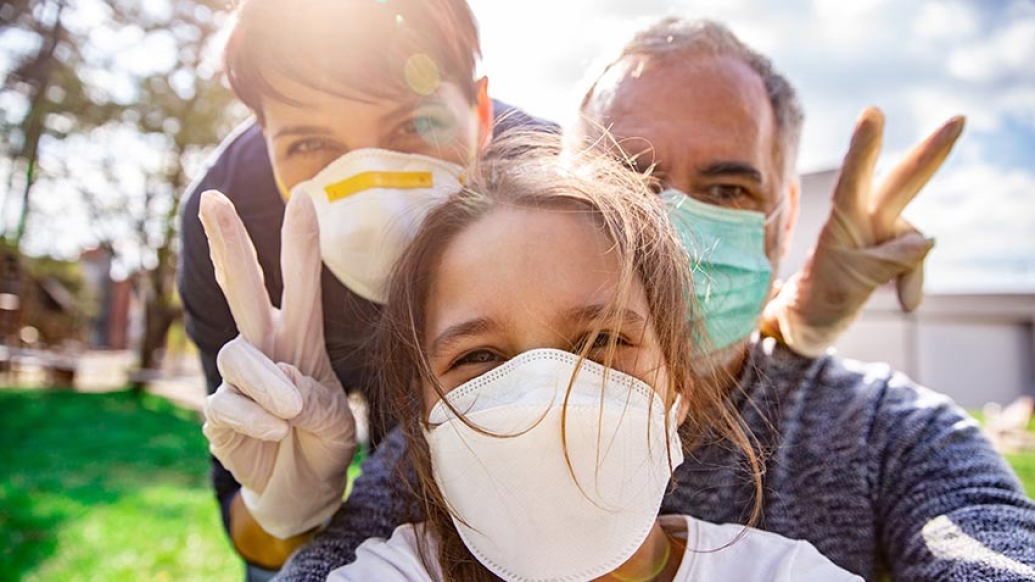Five ways to reduce your risk of COVID-19 over the holiday weekend and beyond.
2:41 PM
Author |

This article was edited May 25, 2022.
Editor's note: Information on the COVID-19 crisis is constantly changing. For the latest numbers and updates, keep checking the CDC's website. For the most up-to-date information from Michigan Medicine, visit the hospital's Coronavirus (COVID-19) webpage.
Just in time for Memorial Day weekend, Michigan's Stay at Home order has been relaxed somewhat to allow gatherings of 10 people or fewer, as well as the opening of bars and restaurants in popular tourist areas in the northern part of the state. And while case counts in some areas are going down, COVID-19 is still out there. How do you safely kick off the unofficial start of the summer during a pandemic?
U-M experts Sandro Cinti, M.D., professor of infectious diseases and Ryan Malosh, Ph.D., assistant research scientist, offer five safer ways to reconnect with family and friends:
1. Stay outdoors
Your best bet for reducing the risk of transmission is meeting up outside, say Cinti and Malosh.
"It's also becoming clear the virus transmits most effectively in indoor settings. There, close contact between infected people and inadequate ventilation are more likely," says Malosh in a recent article for The Conversation. Cinti agrees and says that gathering outdoors with the recommended six feet of distancing between people should be safe. That includes walking and hiking together.
SEE ALSO: Keeping Our Patients Safe During COVID-19
2. Pack a picnic
Implementing a bring your own food or drink policy is the safest way to enjoy a meal together, says Cinti. Sharing the usual communal BBQ fare will take a little more finessing. "When serving from a dish of food, use sanitizer before and after fixing a plate. Pass bottles or cans of beer or soda with a napkin. But no sharing of utensils or cups," he says. Another alternative is to have one person, with washed hands and wearing a mask, pre-portion out plates.
3. Play on the water
Cinti says swimming and other water activities should be low risk. The Centers for Disease Control and Prevention says there is currently no evidence that COVID-19 can spread in pools or other bodies of water. However, care should be taken when lounging by the pool or on the beach. "Again, outdoor events are ok if socially distanced." If you can't stay six feet apart, wear a mask but don't wear a mask in the water, he adds.
MORE FROM MICHIGAN: Sign up for our weekly newsletter
4. Wash your hands and wear a mask
Malosh and Cinti both stress the importance of good hand hygiene and mask wearing, especially since, according to the CDC, up to 40% of transmission may be happening before people feel sick.
"Face masks and hand hygiene reduce the effective contact, or the chance the virus is transmitted if there is contact," says Malosh. Wearing a mask and washing hands are especially important to remember when nature calls. "Bathrooms are places were there can be high amounts of virus on surfaces and in the atmosphere," says Cinti. He recommends washing hands before and after and spending as little time in the bathroom as necessary.
SEE ALSO: Seeking Medical Care During COVID-19
5. Socialize at a distance
Staying as far apart as is practical is important for reducing the risk of transmitting COVID-19. With that in mind, Cinti views eating or drinking inside a bar or restaurant as a risky proposition.
"You have to remove your mask to eat and drink, you're often inside for more than an hour, and transmission can occur even farther than six feet away." Outdoor patio seating may be a safer proposition. Both Cinti and Malosh recommend keeping gatherings small and outdoors.
As always, anyone who is feeling sick should stay home away from other people. And while people at higher risk of severe disease, such as those over 65 or with a suppressed immune system should be especially vigilant, everyone should do their part. Says Cinti, "The advice I'm giving here is relevant to everyone. We should wear masks, wash hands and keep a distance whether you are young or old."
Like Podcasts? Add the Michigan Medicine News Break to your Alexa-enabled device or subscribe for daily updates on iTunes, Google Play and Stitcher.

Explore a variety of healthcare news & stories by visiting the Health Lab home page for more articles.

Department of Communication at Michigan Medicine
Want top health & research news weekly? Sign up for Health Lab’s newsletters today!





